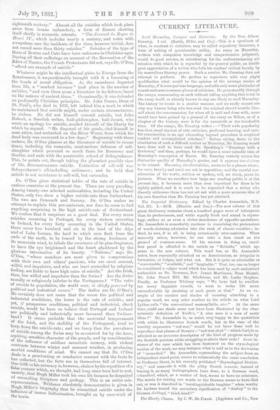The Imperial Dictionary. Edited by Charles Annandale, M.D. Vol. III.
L—SCR. (Blackie and Son.)—The new volume of this great dictionary contains about a hundred pages more of letterpress than its predecessors, and while equally fresh and sound in etymo- logy, strikes us as even a richer storehouse of apposite quotations. Mr. Annandale is remarkably cautious in examining the pretensions of words claiming admission into the rank of classic, vocables ; in- deed, be errs, if at all, in being occasionally over-cautious. When necessity arises, however, he can take a firm stand on the ground of common-sense. Of his success in doing so, excel- lent proof is afforded in tho article on "Reliable," which ap- pears in the new volume. This word has, as Mr. Annandale notes, been repeatedly attacked as an Americanism, as irregular in formation, as vulgar, and what not. But it is quite as admissible as "conversable," "available," and "laughable." That, too, can no longer be considered a vulgar word which has been used by such undoubted authorities as Dr. Newman, Rev. dames Martineau, Dean Mensal, Mr. John Stuart Mill, Mr. Gladstone, and Mr. Leslie Stephen. Finally, as Professor Whitney says, "We have had to swallow too many linguistic camels, to want to make life more uncomfortable by straining at such gnats as that." As an ex- ample of the number and shades of meaning attaching to a popular word, we may refer readers to the article on what Lord Lytton calls "the conventional monosyllable, nice." At the same time, could one shade more not have been illustrated by the char- acteristic definition of Swift's, "A nice man is a man of nasty Ideas P" Mr. Annandale is, as usual, very happy in the quotations with which he illustrates Scotch words, but in the ease of the terribly expressive " red-wat," would he not have done well to reproduce that phrase of Burns's—" red-wat-shod "—which Carlyle so admired as an accurate description of tho kind of progress made by the Scottish patriots while struggling to attain their ends P As an in- stance of the care which has been bestowed on the etymological section of the work, we may instance what is said as to the derivation of "scoundrel." Mr. Annandale, approaching the subject from an independent standpoint, comes to substantially the same conclusion as Professor Skeet, in his recently published "Etymological Diction- ary," and connects it with the pithy Scotch scunner, instead of tracing it, as many lexicographers have done, to a German word, schandkerl, which, as a matter of fact, seems to have no existence. The mania for tracing our words to the German seems to have died out, or was it dissolved in "inextinguishable laughter" when worthy Dr. Latham traced the secondary signification of " donkey " to the German dickkopf, " thick-head P"


































 Previous page
Previous page